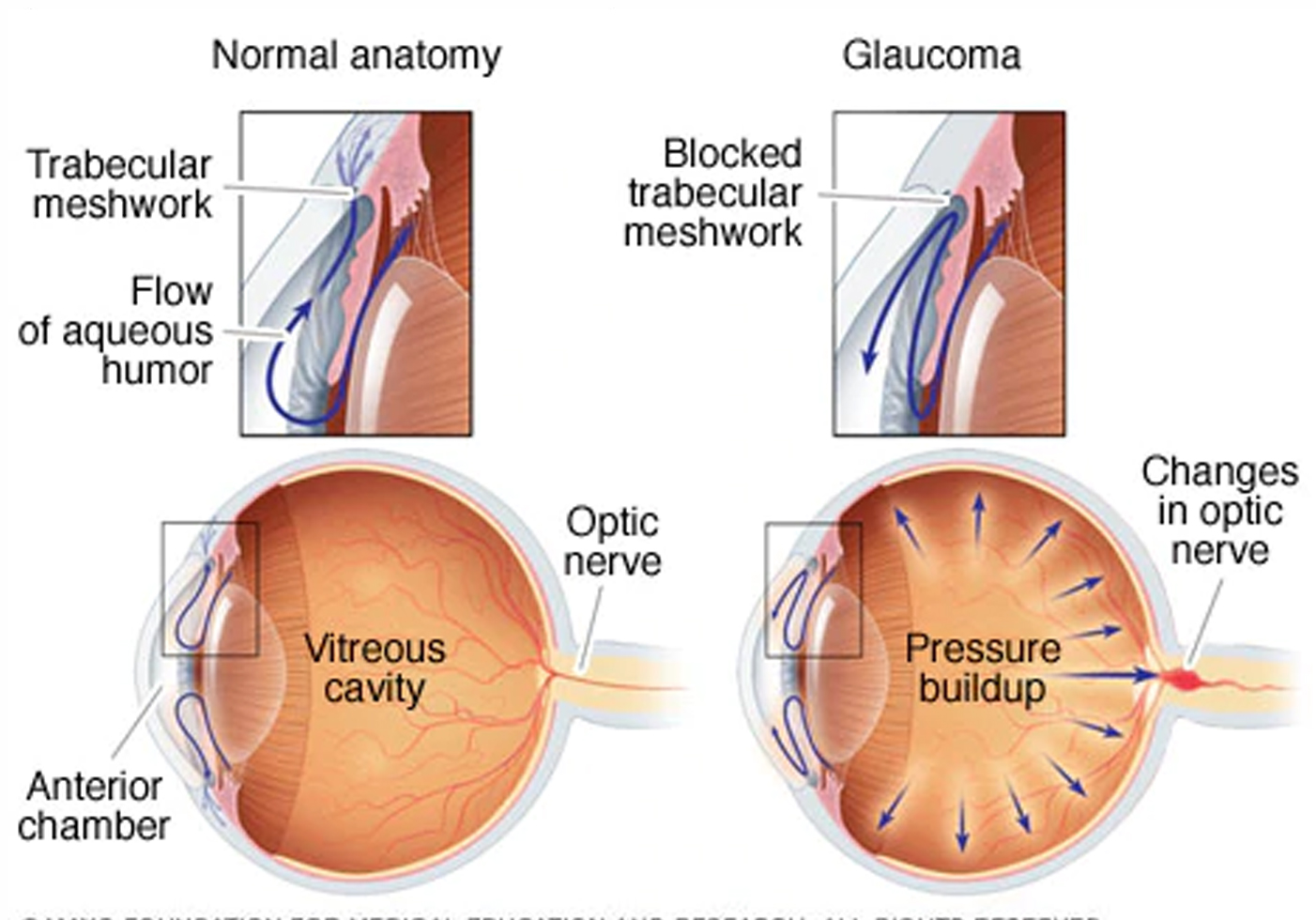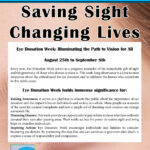Glaucoma is a disease of the optic nerve — the part of the eye that carries the images we see to the brain. It is important for each of us, from infants to senior citizens, to have our eyes checked regularly, because early detection and treatment of glaucoma are the only ways to prevent vision impairment and blindness.


What Is Glaucoma?
Glaucoma is the name given to a group of conditions in which the optic nerve sustains damage where it leaves the eye. In many cases, this damage is associated with a rise in pressure within the eye. As the pressure builds, it compresses the fragile blood vessels supplying the optic nerve, which sends messages to the brain. If left untreated, this can lead to irreversible damage to the optic nerve.
What Causes Glaucoma?
A clear liquid called aqueous humor flows through the eye nourishing the lens, iris, and cornea. When the delicate mesh that forms the drainage system becomes defective (called open angle Glaucoma) or completely blocked (called closed angle Glaucoma) the liquid continues to flow into the eye and pressure builds. It is this build-up of pressure which causes Glaucoma.
Recognizing the Symptoms
The most common form of Glaucoma, open angle, starts gradually with darkening at the outer edges of your sight (peripheral vision) and gives no warning symptoms until a very late stage, when much irreversible damage has been done to the field of vision.
Without treatment it can progress to complete blindness.
A much less common form of Glaucoma, acute closed angle, starts with severe pain in the eye, headache, blurring of vision, halos around sources of light. This needs immediate treatment.
Who is at risk ?
It is important for each of us, from infants to senior citizens, to have our eyes checked regularly, because early detection and treatment of glaucoma are the only ways to prevent vision impairment and blindness. This may apply to you if: You are 55 years & above and have not had eyes examined regularly Someone in your family has a history of glaucoma Myopia (nearsighted)
Diagnosing
1. An annual eye examination is as important as a regular vision test. This examination will measure both the pressure within the eye, fundoscopy (Cup/Disc ratio) and the field of vision.
2. These tests together are more effective in the detection of Glaucoma than the standard eye test alone.
3. A regular test of the pressure within the eye can detect Glaucoma. (Tonometry)


Treatment
Although treatment can control Glaucoma, and possibly avoid or delay the need for surgery, sight loss cannot be recovered so early detection and treatment are vital.
Most drug treatments aim to reduce the production or drainage of fluids in the eye. It is very important to use prescribed medication regularly and not to miss doses.
1. Laser Treatment: If the condition cannot be controlled using medication, it may be necessary to have laser surgery. The drainage holes are opened using a laser beam and the pressure within the eye is then controlled with the appropriate medication.
2. Surgery: An eye specialist may recommend surgery to help control Glaucoma through which the aqueous fluid can escape from within the eye and drain away under the loose covering of the eye (conjunctiva).
3. Eye Care: Eye drops should be applied correctly to be of maximum benefit. Consult your doctor for correct administration of drops.
Frequently Asked Questions
1. Is glaucoma curable?
It is not curable, but it is manageable usually with simple medications such as eye drops and pills.
2. Which age groups are most affected?
All age groups are at risk , though elderly persons above the age of 60 years are more at risk.
3. Does it cause blindness?
If left untreated, glaucoma can cause blindness. About 10% of patients with glaucoma who receive proper treatment may still have loss of vision. Loss of vision from glaucoma is irreversible.
4. How can I protect myself against the damage that it can cause?
You can protect yourself from loss of vision due to glaucoma through regular eye examinations, taking your medication as prescribed and good eye care.
5. What is the role of surgery?
Surgery is done when medications are not effective or they cause intolerable adverse effects. Surgery is effective in relieving , but the condition can recur even after surgery.
6. Will it affect my work?
Many people have productive lives despite having glaucoma. Ensure good lighting at the work place and get magnification of texts if needed. Maintain good communication with your employer / supervisor. Above all, be positive!


Dr Hareesh K V
Medical director
Abhishek Nethradhama
Krupa Bindu, No.971/37, Mig 15Th A Cross, A Sector
Next To Gk Vale Studio Khb High Rise Apartment
Ambedkar Colony, Yelahanka New town
Bangalore -64
Ph: 080-4093 3219/77957 15203











